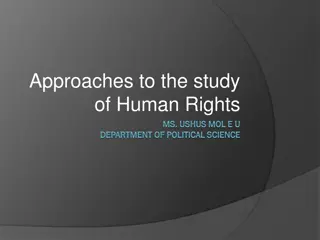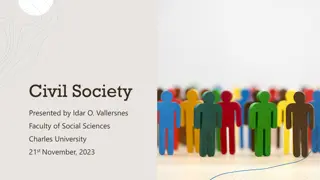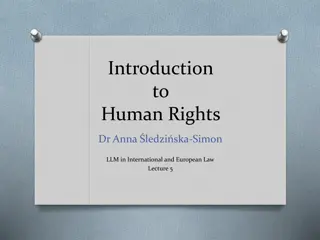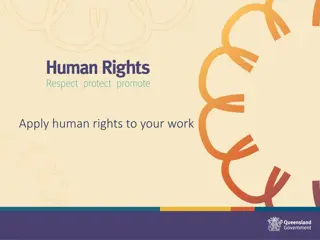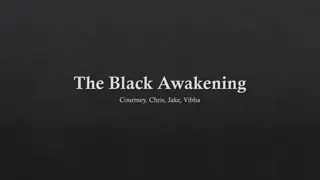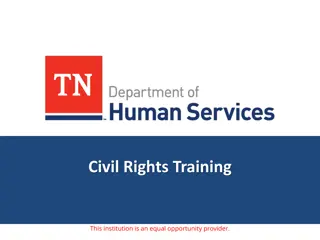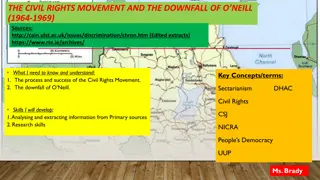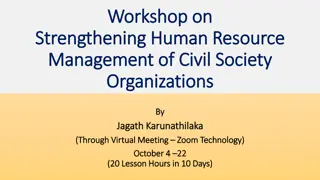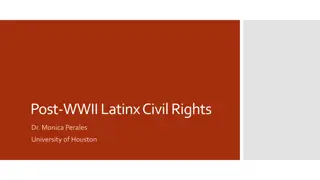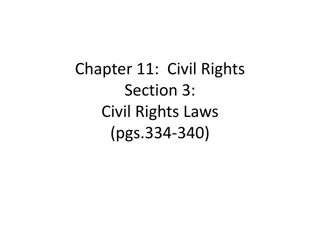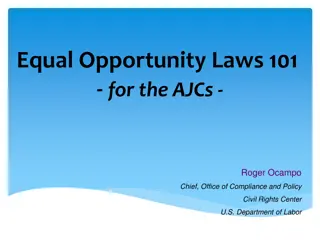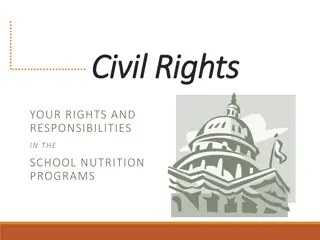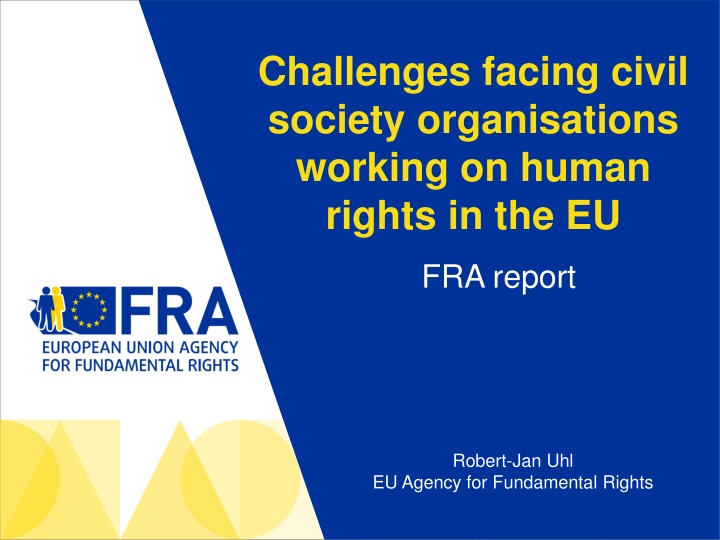
Challenges Facing Civil Society Organizations Working on Human Rights in the EU
Civil society organizations working on human rights in the EU face various challenges in the regulatory environment, access to resources, participation, and creating a safe environment. These challenges overlap with global points identified by the UN, emphasizing the importance of a gender perspective and implementing Sustainable Development Goals. The EU and Member States are focusing on supporting civil society organizations in terms of resources, engagement, and protecting human rights defenders.
Download Presentation

Please find below an Image/Link to download the presentation.
The content on the website is provided AS IS for your information and personal use only. It may not be sold, licensed, or shared on other websites without obtaining consent from the author. If you encounter any issues during the download, it is possible that the publisher has removed the file from their server.
You are allowed to download the files provided on this website for personal or commercial use, subject to the condition that they are used lawfully. All files are the property of their respective owners.
The content on the website is provided AS IS for your information and personal use only. It may not be sold, licensed, or shared on other websites without obtaining consent from the author.
E N D
Presentation Transcript
Challenges facing civil society organisations working on human rights in the EU FRA report Robert-Jan Uhl EU Agency for Fundamental Rights
Background FRA Founding Regulation: FRA cooperates with non-governmental organisations and civil society organisations working on fundamental rights in the EU FRA data collection about situation 2011-2016. FRA consultation with CSOs, including funders and foundations Public launch event 19 January 2018, Brussels 2
In a nutshell 4 areas regulatory environment access to resources participation safe environment broadly overlap with points identified by UN for civil society space globally gender perspective & implementation of Sustainable Development Goals (SDGs) in external relations, the EU and MSs have placed great emphasis on supporting CS, in particular with regard to resources, engagement and protection of human rights defenders. 3
Terminology CSOs: FRA s Founding Regulation: as non-governmental organisations and [ ] institutions of civil society, active in the field of fundamental rights Civil society space is the place civil society actors occupy within society; the environment and framework in which civil society operates; and the relationship among civil society actors, the State, private sector and the general public. OHCHR Council of Europe Committee of Ministers Recommendation 14 (2007): voluntary self-governing bodies or organisations established to pursue the essentially non-profit-making objectives of their founders or members. 4
Enabling regulatory environment To do their work, CSOs involved in promoting FR need to be able to exercise their rights fully without unnecessary or arbitrary restrictions Positive obligation to promote human rights and create an enabling environment for CSOs 5
Enabling regulatory environment Challenges Freedom of association Registration Prohibition and dissolution Entry restrictions Freedom of opinion, expression and information Transparency laws Defamation legislation Freedom of peaceful assembly Content restrictions; blanket restrictions, bans Policing of assemblies, cyclical and simultaneous assemblies Lobbying regulations, advocacy restrictions Counter-terrorism/emergency laws 6
Regulatory environment - FRA Opinions Increased attention needed when drafting and implementing legislation in areas which potentially (directly or indirectly) affect civil society space Lobbying regulations and transparency laws and their application should comply with applicable EU and international law, and not disproportionately restrict or hinder human rights advocacy 7
Finance and Funding legal frameworks and policies on resources have significant impact on freedom of association & CSO ability to work effectively Comprehensive data on public and private funding not available in most Member States CSOs in the EU, the European Parliament, as well as the European Economic and Social Committee (EESC), have recently called for a European Values Instrument to promote human rights, democracy and rule of law 8
Finance and Funding Challenges Promising practices Amounts depending on Member State Project funding vs core funding Annual/short term funding vs multiannual funding Procedures, reporting Co-financing, cash flow Side effects of anti-terrorism and money-laundering rules; foreign funding Tracking government funding Estonia, Slovenia Promoting advocacy activities In Estonia and Poland, a specific amount of public government funding is dedicated to advocacy and litigation activities. Volunteering to count as co-financing (EU, upcoming) Funding from lottery revenues Croatia, Czech Republic, Finland, Hungary 9
Funding FRA Opinions Need to ensure funding is made available, including for small organisations Funding should cover variety of activities - service provision, watchdog activities, advocacy, litigation, campaigning, human rights education and awareness raising Under free movement of capital, CSOs should be free to solicit, receive and utilise funding not only from public bodies in their own state but also from institutional or individual donors, and public authorities and foundations in other states or from international organisations, bodies or agencies Audit and reporting requirements should be proportionate 10
Right to participation Seeking input into law and policy proposals by stakeholders, including from civil society, is one of the tools for democratic, evidence-based policymaking and adds democratic legitimacy There seems to be agreement on the need to involve civil society organisations in policymaking, from local to EU levels However, practical implementation is not satisfactory 11
Participation Promising practices Challenges Limited access to information Lack of minimum standards or clear rules, or lack of knowledge about these and hence inconsistent implementation Lack of skills in the various methods to involve stakeholders in law- and policymaking in a meaningful way Short timing, often no feedback Specific challenges regarding persons with disabilities One-stop-shops for information on public consultations Bulgaria, Finland, Greece, Malta, Romania, Slovenia, European Commission Training sessions training sessions for public officials and guidelines for public participation, as well as a tailored-made manual for officials - Slovenia Resource website Resources and tools for participation and sustainable development in Europe Austria CRPD implementation Good examples in a number of countries 12
Participation - FRA Opinions Maintain open, transparent and regular dialogue with CSOs active in the area of human rights Uphold obligations under Article 4 (3) CRPD Make available adequate human and financial resources for proper participation processes, and provide public servants with training and time for engaging Use newly adopted Council of Europe Guidelines for meaningful civil participation in political decision-making 13
Safe space for civil society Challenges Promising practices Public statements in support of CSOs Physical attacks, threats, intimidation Negative public discourse and smear campaigns Surveillance Mental health Effective investigations regarding incidents Psychological support (including by volunteer networks) 14
Safe space - FRA Opinions Refrain from stigmatisation of human rights CSOs Condemn crimes against CSOs, and fully implement positive obligations under international law and applicable EU law to protect CSOs and their members Data on hate crimes against human rights CSOs should be collected and published 15
Thank you Fundamental Rights Promotion Department fra.europa.eu

